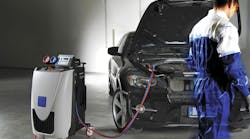The failure of the 115th Congress to address new vehicle technology policy has created quite the dilemma for several key issues important to the automotive sector. Specifically, for the aftermarket, this applies to data access.
Although autonomous vehicle legislation (AV), the Self-Drive Act, passed the U.S. House of Representatives by a voice vote, the U.S. Senate’s AV legislation, the AV START Act, stalled after Senate Commerce Committee passage. Why does this matter? With the failure of the Congress to address AV research and implementation policies, this leaves the U.S. Department of Transportation (DOT) or state governments to move forward with policies. This has not occurred at DOT, but it is a different story for states.
The Obama Administration opted for policy guidelines versus regulation in September 2016 publishing “Federal Automated Vehicles Policy, Accelerating the Next Revolution in Roadway Safety.” These “Best Practices” and model state policy guidelines provided no regulatory teeth to AV implementation. The current administration has issued two additional broad policies, “Automated Driving Systems: A Vision for Safety 2.0” and “Preparing for the Future of Transportation: Automated Vehicle 3.0.” Despite these additional guidelines, the lack of federal legislative and regulatory implementation has created a breeding ground for inconsistent new vehicle technology policies. This comes not only in the form of a patchwork of state laws, but also multiple areas of direction for federal legislation. Specifically, states have not waited on the enactment of federal law. Many states have moved forward with their own AV legislation and numerous states have seen bills become law. A 50-state footprint of laws is not the best approach for AV regulation and could actually inhibit innovation. It certainly has repercussions for other aftermarket areas of interest. More on this later.
According to the National Conference of State Legislatures earlier this year:
- Twenty-nine states—Alabama, Arkansas, California, Colorado, Connecticut, Florida, Georgia, Illinois, Indiana, Kentucky, Louisiana, Maine, Michigan, Mississippi, Nebraska, New York, Nevada, North Carolina, North Dakota, Oregon, Pennsylvania, South Carolina, Tennessee, Texas, Utah, Virginia, Vermont, Washington and Wisconsin — and Washington D.C. — have enacted legislation related to autonomous vehicles.
- Governors in Arizona, Delaware, Hawaii, Idaho, Illinois, Maine, Massachusetts, Minnesota, Ohio, Washington and Wisconsin have issued executive orders related to autonomous vehicles.
At the federal level, there has been some discussion of reviving last year’s AV legislation. Former U.S. Senate Commerce Committee Chairman John Thune (R-SD) noted that AV legislation for the 116th Congress still has problems related to how much power states should have over regulating AVs. These were significant issues, in the Senate, last year. With the House now controlled by Democrats, preemption will become an even greater issue in the AV debate.
How does this impact data access for independent repairers? The Senate AV START Act contained provisions for a stakeholder data access and cybersecurity committee at the National Highway Traffic Safety Administration (NHTSA). The Federal Trade Commission (FTC) was also approved by the Commerce Committee to be part of this stakeholder process. Since this bill was not considered on the Senate floor, many of these critical issues have rolled to the 116th Congress. Whether it’s part of privacy, AV, data or other legislation at the federal level, data access for independent repairers will be part of the conversation. Various bills have been introduced at the federal level on some of these issues which directly or indirectly impact automotive repair shops. At the state level, California has passed significant privacy legislation and the Massachusetts legislature will soon consider amending their Right to Repair law.
Highlighting the lack of action at the federal level, the U.S. DOT recently terminated the Advisory Committee on Automation in Transportation. This was a federal advisory committee established during the Obama Administration. The DOT noted that the Committee was not active. In addition, “Based on USDOT’s development and publication of AV 3.0 policies and principles, active stakeholder engagement is already underway. Therefore, the USDOT does have the ability to obtain broad stakeholder feedback on AV matters outside of the committee.”
The next 18 months will be important for determining a path forward on new vehicle technology policy and, important for independent repairers, data access policy.
The Automotive Service Association (ASA) and the Alliance of Automobile Manufacturers are hosting a Technology and Telematics Forum in Troy, Michigan on Sept. 12, 2019 to discuss many of these issues critical to independent repair shops, www.asashop.org.

